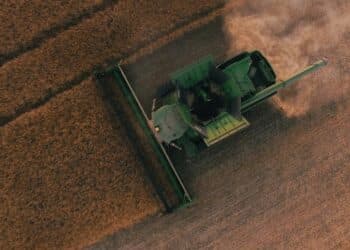Deere & Co expects sales of farm tractors and combines in Brazil will overtake those to Europe in the next five to 10 years, eventually making it the company’s second-biggest market.
Sales of machines used to sow, spray chemicals and harvest crops will climb fast in the South American nation as Brazilians continue to rapidly expand soybean and corn production to meet booming demand, according to Deere’s Chief Financial Officer Joshua Jepsen.
“Brazil is increasingly important to our strategy,” Jepsen added.
The nation is the world’s top soybean producer and trails only the US in exports of corn. Its farmers usually reap two crops a year and still have millions of acres that can be converted into farmland, giving them an edge over competitors in the US and Europe. The nation is also turning more corn into fuel than ever before, helping boost demand for the grain.
Underscoring Brazil’s rising importance in Deere’s strategy, the world’s largest farm machinery maker flew about 40 investors, including from the US, to its facility in Indaiatuba, Sao Paulo, on Tuesday to discuss the country’s growth outlook and meet farmers. Deere expects a 27% increase in grain acreage in Brazil over the next 10 years, while corn ethanol production should double in the same period.
While much of the country’s rural areas lacks cell coverage, Jepsen said expanding Brazilian farmers’ access to Deere’s precision agriculture and automation products will be key for gaining market share over the coming years.
Deere last year partnered with Elon Musk’s satellite internet company, Starlink, to improve farmers’ connectivity as well as the use of the company’s precision technology, which utilizes tools including GPS and data analysis.
“Deere is the clear industry leader in precision technology, which will be key in driving and capturing value in Brazil,” Baird analysts said in a note to clients on Tuesday.
Citi analysts, in a note to clients, said Deere is welll positioned in Brazil “to capture outsized growth by leveraging its strong dealer network, tech stack and full-scale in-region manufacturing footprint.”
While the company projects flat sales for the industry in South America in the 2025 fiscal year, it forecasts an increase of more than 10% on shipments from its plants to dealers in the same period, Correia said.
Equipment sales to farmers in Brazil dropped in the past few years as tumbling crop prices gave farmers less to spend, leading to a decline in dealer inventories, which are now being replenished.
— By Clarice Couto (Bloomberg)









